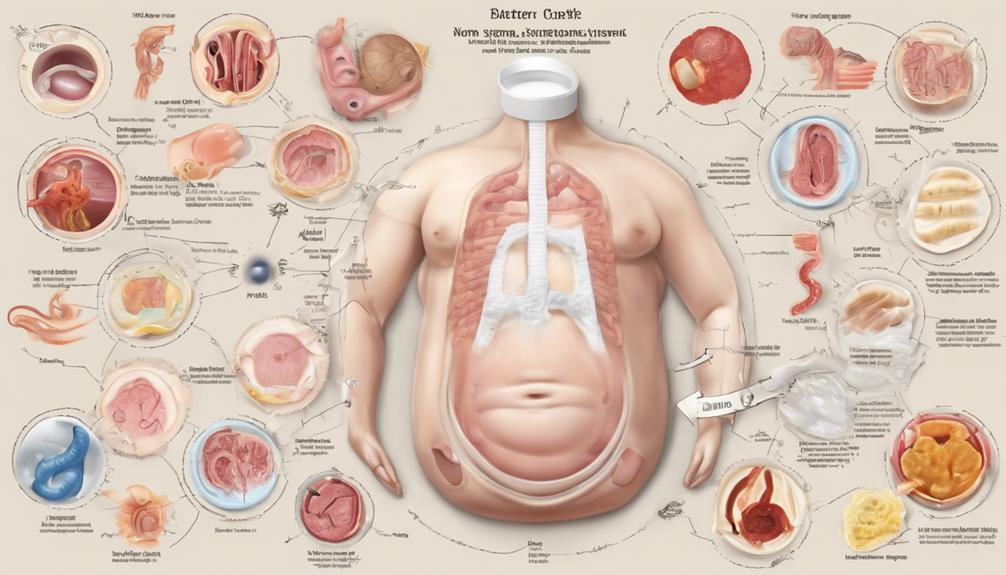Ever wondered why your newborn won't poop, causing you endless worry and late-night Google searches?
The struggle to decipher your baby's poop mysteries can be overwhelming, but fear not – our guide has the answers you seek.
From unraveling the reasons behind constipation to offering gentle remedies and expert advice, we've got you protected.
So, what secrets lie within the pages of this essential guide, waiting to ease your parental concerns and provide you with the knowledge needed to navigate this delicate aspect of newborn care?
Key Takeaways
- Monitor newborn's bowel movements closely for signs of constipation.
- Seek medical advice for unusual bowel patterns or discomfort.
- Encourage healthy digestion with proper feeding schedules and water intake.
- Use gentle remedies like massages or fiber-rich foods to alleviate constipation.
Common Reasons for Newborn Constipation
When newborns experience constipation, it can be attributed to a variety of common reasons, each requiring careful attention and understanding. In the case of breastfed infants, it's normal for them to go without a bowel movement for up to a week due to the efficient digestion of breast milk.
However, if formula-fed babies experience changes in their usual bowel movement frequency, it could signal constipation. Straining during bowel movements, especially with hard or dry stools, is a clear sign of constipation in newborns.
Parents should also be aware of other concerning symptoms like blood in the stool, abdominal swelling, or vomiting, as these could indicate a more serious underlying issue that requires immediate medical attention.
If newborns show signs of insufficient intake or discomfort while trying to pass stool, it's important to monitor them closely and seek guidance from a healthcare provider to address the constipation effectively.
Understanding Newborn Digestion

Understanding how newborn digestion functions provides valuable insights into their bowel movements and overall health. Newborns typically pass meconium, their first bowel movement, within 48 hours of birth, which is dark and sticky. Breastfed babies may have less frequent bowel movements, sometimes going up to a week without pooping, due to efficient breast milk digestion. On the other hand, formula-fed infants usually have more regular bowel movements, ranging from once a day to every few days. Straining during bowel movements in newborns can be normal as their digestive system is still developing. However, if your baby shows signs of discomfort like bloating or has hard stools, it could indicate constipation and may require medical attention.
| Breastfed Babies | Formula-fed Babies |
|---|---|
| Less frequent bowel movements | More regular bowel movements |
| Efficient breast milk digestion | Ranging from once a day to every few days |
Understanding these differences in newborn digestion can help parents better interpret their baby's bowel movements and identify any signs of constipation early on.
Gentle Remedies for Constipation
Let's explore simple yet effective remedies to ease your newborn's constipation discomfort. When babies start solid foods, it's vital for them to poop less frequently.
To help regulate their bowel movements, consider offering a few ounces of water if your baby is over 6 months old. Introducing fiber-rich foods like puréed prunes, sweet potatoes, or fruits in Baby's First meals can also aid in preventing constipation.
Gentle exercises such as moving your baby's legs in a bicycle motion or taking a walk together can stimulate bowel movements. Massaging your baby's stomach or giving them a warm bath can provide relief from constipation discomfort.
Remember, before trying infant glycerin suppositories, it's crucial to seek medical advice, especially for newborns. Monitoring your baby's gaining weight and paying attention to stool consistency can also help you assess their digestive health.
These gentle remedies can often help alleviate constipation in a natural and soothing way.
When to Seek Medical Advice

If your newborn shows signs of discomfort or unusual bowel movements, it's important to promptly seek medical advice from a pediatrician.
Contact the doctor if your baby hasn't passed meconium within 48 hours of birth, strains to poop, or has hard, dry stools. Notify the doctor if your little one appears irritable, has a bloated belly, vomits, or shows signs of blood in the stool.
Less frequently, medical attention is necessary if your baby experiences abdominal swelling, hardness, or a persistent lack of bowel movements. In rare cases of bowel obstruction, immediate evaluation is required for newborns showing severe symptoms.
Tips for Promoting Healthy Bowel Movements
To promote healthy bowel movements in newborns, establishing regular feeding schedules is essential. This helps regulate their digestive system and encourages regular bowel movements. Additionally, offering small amounts of water to babies over 6 months old can aid in bowel regularity by preventing dehydration.
When starting solids, gradually introduce high-fiber foods like fruits and vegetables to prevent constipation and promote healthy digestion. Monitoring diaper output is vital in tracking bowel movements and ensuring that the baby is eliminating waste properly.
If constipation persists or if there are concerning symptoms such as blood in the stool or abdominal pain, it's important to consult a pediatrician for guidance and support. Remember, every baby is different, so finding the right balance of feeding schedules, water intake, and high-fiber foods may require some trial and error. Trust your instincts and don't hesitate to seek professional advice when needed.
Frequently Asked Questions
What's the 7 Second Poop Trick?
The 7 Second Poop Trick involves gently massaging your baby's belly for about 7 seconds in a clockwise motion. It helps stimulate bowel movements by promoting intestinal movement. This non-invasive technique can aid in relieving constipation naturally.
How Come My Newborn Won't Poop?
We comprehend the concern when a newborn won't poop. It's common for breastfed babies to go days without pooping due to efficient digestion. Formula-fed infants usually have more regular bowel movements. Consulting a pediatrician can provide reassurance.
How Do I Stimulate My Baby to Poop With Q Tips?
We gently stimulate our baby's rectum using a lubricated Q-tip, rotating it slightly to trigger a bowel movement. We guarantee caution and gentleness to avoid harm. If problems persist, consulting a pediatrician is vital for further guidance.
How Do You Exercise a Newborn to Poop?
When it comes to helping our newborn poop, gentle movements like leg bicycles, lap walks, stomach massages, and warm baths can work wonders. These activities support digestion, alleviate gas, and promote regular bowel movements.
Conclusion
As we navigate the mysterious world of our newborn's digestion, we find comfort in the symbolism of their first poop. Just as that first milestone signifies a new beginning, so too does our journey as parents learning to care for our little one.
With knowledge, patience, and love, we can guide them through any challenges they may face, ensuring their health and well-being always come first. Trust in the process, and remember, we're in this together.










